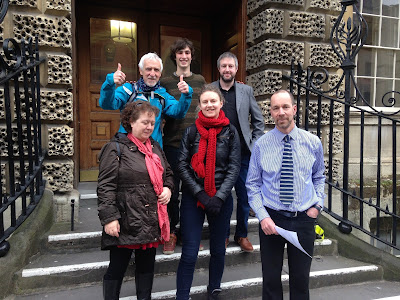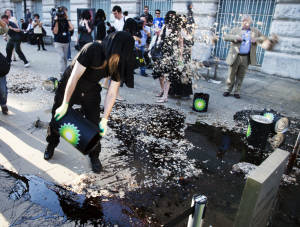A personal journey - from Click-tivist to Direct Activist
I just received one
of those “2 years ago today” messages on facebook and have been reminded of the
day on which I became an activist.
If you had told me two
years ago that I would be planning a cycling trip to South Wales today, to take
part in an illegal occupation of a coal mine, I would have said you’ve got the
wrong girl. Yet today, I find myself in that very situation. I’ve just booked my ticket for the Time
to Cycle bike ride, and I’m dusting down my tent preparing for the Reclaim the Power camp at Ffos-y-Fran,
the largest opencast coal mine in the UK, at the end of this month.
I’d like to tell
you how I got here today.
Back in 2014, I
wasn’t interested in the coal industry, or climate change. I was in the midst
of setting up my own café for which I’d been saving up for ten years. I was
busy getting on with life and I didn’t think climate change was my problem.
Don’t get me wrong,
I knew about climate change, but I thought it was a distant problem; not
something that was going to affect me, and certainly not any time soon. What’s
more I assumed someone else was looking out for my interests, making sure climate
change wouldn’t ever be something I would have to worry about. That “someone
else” being… David Cameron? Greenpeace? I didn’t really know, but I certainly
didn’t think I had anything to do with it.
I did my bit: I
always rode my bike instead of driving, I did my recycling like a good citizen
and always re-used my plastic bags. Beyond that, climate change didn’t ever enter
my mind, and didn’t affect my life in any way.
In doing some
research for my café one day (in fact, exactly two years ago today) I came
across a café in the United States which was selling itself as a “Zero Waste”
café, and doing rather well out of it. So I looked into this idea, and stumbled
upon this video, from the
fantastic Story of Stuff website.
Please watch the
video if you haven’t already. I was very naïve, and it opened my eyes.
This changed my
life. I felt totally shocked after watching it and my whole world view was
suddenly changed. I realised that not only was climate change already
happening, and affecting people around the world, but the whole system, the
whole economy, was not fit for purpose. It made sense to me, as a
mathematician: you can’t have infinite growth on a finite planet.
I wanted to do
something, I wanted to make a difference. The first thing I did was vow never
to buy a disposable plastic bottle of water ever again, and I posted the video
on facebook. It was a small thing, but I thought when my friends saw it, they
would feel the same way as I did and would want to join me. Weirdly it didn’t
get any “likes” and only one comment.
Beyond that I
didn’t really know what to do.
A month or so
later, I received an email from Avaaz.org. I had been signed up to Avaaz for a
while, and had signed and shared some petitions on facebook; I was a typical “click-tivist”.
But this email was different.
It said “This is
the most important campaign we’ve ever run,” and instead of asking me to sign a
petition, it asked me to get up off my couch and march for the climate. Avaaz
were planning the massive “People’s Climate March” to demonstrate widespread
support for government action on climate change. It was scheduled for the day
before world leaders were due to meet in New York for a United Nations summit
on climate change.
I immediately
thought “Yes, I can do that!” and clicked on the email. It took me to a site
which then asked me “Would you be willing to help organise a march in your
City?” I didn’t hesitate to click “yes” again. Then it asked me “Would you be
willing to be the MAIN organiser of the march in your city, if there isn’t
already someone doing it?”
Now, I had never
even been on a protest march before, let alone organised one. But I did have
experience of organising events – beer festivals and the like – so I thought,
“How hard could it be?!” and clicked “yes” again.
That was how I
ended up organising the People’s Climate March in Bristol in September 2014. Now
some people think marching doesn’t achieve anything, but for me that was the
perfect entry point into activism. Through that march, I met loads of local
people and learned about lots of different campaign groups: Greenpeace and
Friends of the Earth groups, the Dharma Action Network for Climate Engagement,
and the People’s Assembly against Austerity to name but a few. But the one
campaign which really resonated with me was the Fossil Free Divestment
campaign.
The premise made
sense to me: “If it is wrong to wreck the planet, then it is wrong to profit
from that wreckage”. In other words, we shouldn’t be investing money in the
fossil fuel industry anymore, whether through our banks, pensions or local
councils. I immediately pledged to move my own savings account from HSBC to Triodos
Bank. That was really easy – too easy! - so I decided to organise a flashmob
for global divestment day, to urge other
people to move their money to banks which don’t invest in fossil fuels.
Then I joined this
campaign - Fossil Free Bristol. They had just won a pledge from the Mayor,
saying that Bristol City Council would never invest in fossil fuel companies,
and I wanted to join them in calling on the council’s pension fund – the Avon
Pension Fund - to divest as well.
After a couple of
months, I could no longer concentrate on the day job. Climate change, and campaigning
was taking up more and more space in my brain, and all I wanted to do was talk
to all my colleagues and customers about it. They would smile and nod politely
but generally didn’t want to hear about it.
So I quit my job. I
decided that 2015 was too important a year in the fight against catastrophic
climate change that I had to dedicate myself to the cause on a full time basis.
I had some money saved up and calculated that I could survive without a pay check
for about 12 months.
Why was 2015 so
important? Well, at the end of last year, the UN met for the 21st
year in a row, to discuss, the COP21 in Paris, what should be done about climate change. And for the
21st year in a row, they failed to come up with any concrete
solutions.
You may have read
headlines in December which made it sound like they reached a
binding agreement. Like this one from the BBC website entitled “COP21 climate
change summit reaches deal in Paris”. But if you read the articles, you’ll
notice that the agreement is not entirely legally-binding, and there are very
few specifics.
To me, the Paris
Agreement is a bit like a morbidly obese patient “agreeing” with their doctor
that they are going to work towards an agreed healthy weight, but not actually
agreeing to change their diet or exercise regime at all.
Not reaching a
legally binding agreement at COP21 was a red line for me. I decided months
before that if they crossed that line, I was going to step up the pressure. And
that’s where I find myself today.
Urgent action is
required now because of the slow-reacting nature of the climate; the actions we
take now will not have an effect for thirty of forty years. Our world governments
don’t seem to be able to see beyond the next election, and are in the pockets
of corporate lobbyists. Just look at the Tory
Peer, Matt Ridley (and if you think I’m exaggerating about corporations trying
to delay action on climate change, I recommend Merchants of Doubt).
So what good does
it actually achieve, to shut down a coal mine for a day? Surely the mine will just
resume work again the next day. Sure. The mining company, Miller Argent, will
lose some money, yes, but it will be a drop in the ocean compared to their
annual profits. And even if we did secure the end of coal mining in the UK, we
are still burning coal in UK power stations, so we would just have to import
coal from elsewhere, which would increase carbon emissions. Aren’t we just
denying ordinary working people the opportunity to work?
Well, we’re not
just protesting against this mine. Although we are showing solidarity for the local
residents who oppose the new mine at Nant Llesg, this action is part of a world-wide
month of action against fossil fuels. And by doing this, along with everything else we are doing, we want to show that we are strong enough, organised enough, and numerous enough to Reclaim the Power!
Often direct
activists are sneered at, branded terrorists, looked down-upon by others, even
by those fighting the same cause. In hindsight it is easy to look back and say
that the ends justified the means, but at the time people are not always
receptive to illegal, direct campaign tactics.
But look at any
campaign that has achieved significant social change in the last few hundred
years, and you will find evidence of people taking matters into their own hands.
Today the Suffragettes are celebrated as heroes, their actions justified as
necessary to get the attention they deserved. There is even a plaque
commemorating Emily Wilding Davison in the House of Commons. But at the
time they were dismissed as “not real women” because they weren’t sweet and
gentle as women “should be”. And they were chastised for giving the suffragist
movement (non-direct action) a bad name.
I guess I also feel
that I’ve done almost everything else I can do, within the law, to try and stop
climate change. I’ve changed my energy supplier. Stopped buying meat and dairy
and anything in plastic packaging. I’ve stopped buying anything new (apart from
bicycle inner tubes), and since the beginning of last year, vowed never to fly
again.
The Fossil Free Divestment campaign is growing at an exponential rate,
and is no doubt having an effect on the way people view the fossil fuel
industry. I do see evidence that there is change happening (see 10:10 if you don’t see it yourself), and I know
that I have influenced countless friends to think about their own personal choices
– to eat less meat, to fly less, to cut out plastic packaging – because they
tell me all the time. But I still want to do more.
There’s also an
element of FOMO - fear of missing out. I want to be there when it is announced
that coal is no longer a viable fuel. I want to be there when the last mine
closes and the last coal-fired power station demolished. I want to be able to
say “I did that!” Women
have a long history of changing the world through direct action, and I want
to be a part of it.
Join me!
"Nonviolent direct action seeks to create such a crisis and foster
such a tension that a community which has constantly refused to negotiate is
forced to confront the issue. It seeks so to dramatize the issue that it can no
longer be ignored." (Martin Luther King, Jr., Letter from a Birmingham Jail)




























